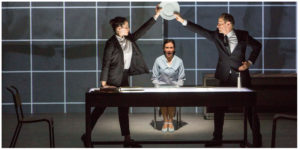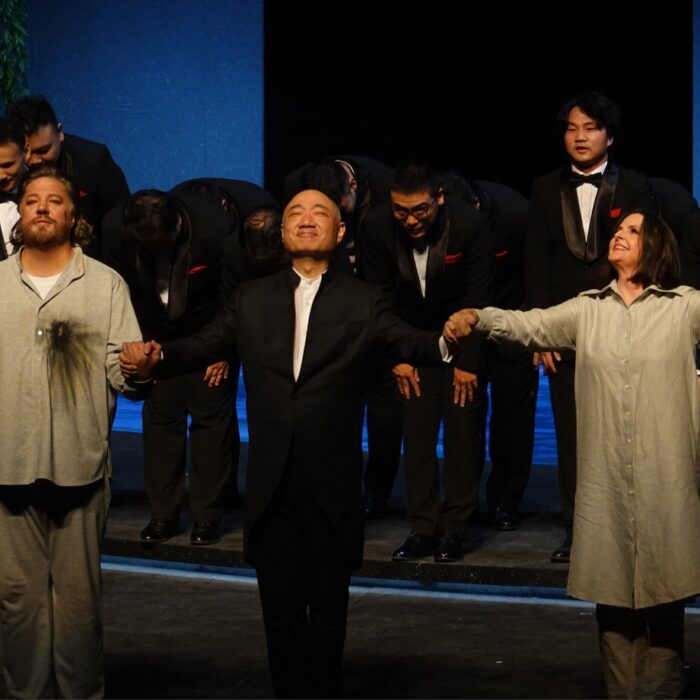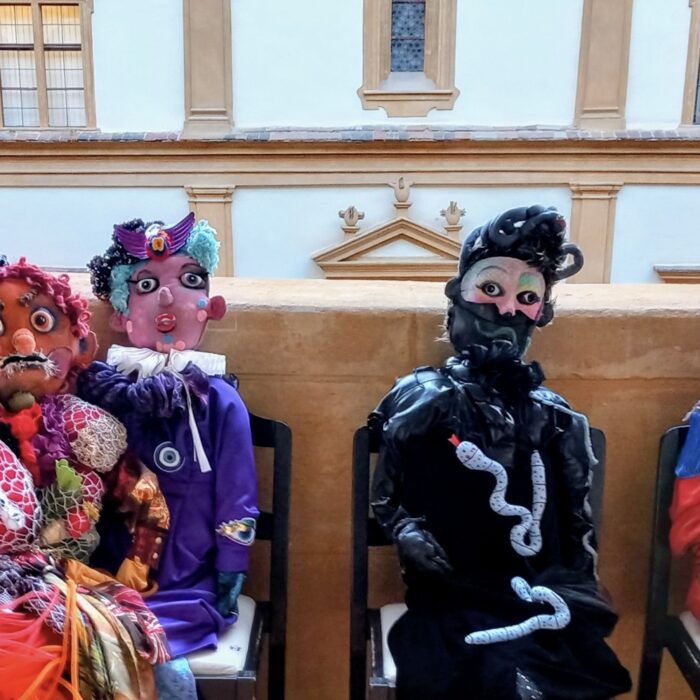
Royal Opera House / Irish National Opera 2023 Review: Least Like The Other, Searching for Rosemary Kennedy
An Unflinching Account of Crisis & Cruelty from Brian Irvine & Netia Jones
By Benjamin Poore(Photo: INO, Kip Carroll)
“Least Like The Other” continues the Royal Opera House’s partnership with Irish National Opera in Covent Garden’s Linbury Theatre, following last year’s “Bajazet.” This new work is centuries away from Vivaldi’s pasticcio and a world apart stylistically, but what binds them both is the unerring pursuit of bracing theatrical intensity.
“Least Like The Other, Searching for Rosemary Kennedy” is a 70-minute unbroken arc devised by Netia Jones with music by Brian Irvine, commissioned by INO and first performed at the Galway International Arts Festival in 2019.
The central story is that of Rosemary Kennedy, sister to the famous John F., whose life is a story of marginalization, mental health crises, medical mistreatment, and ignorance. The text is built from archival materials, many recently resurfaced. They chronicle her life, but also the institutional cruelties of patriarchy, particularly around the kinds of horrifying medical and psychological treatments and theories that defined Kennedy’s mistreatment.
Through her life we are given a snapshot of a family life equally as suffocating as the wider social attitudes reflected in the work of dangerous charlatans like Henry Goddard (the ‘inventor’ of the lobotomy), Martin Barr (who ran the Pennsylvania Training School of Feeble-Minded Children) and Alfred Binet (the 19th-century psychologist whose intelligence test gives the piece its title). The subtitle reflects the ways in which institutions and ideas found Kennedy, and trapped her in the amber of their prejudicial ideas; Irvine and Jones’ collaboration represents an attempt to re-find the person hidden away in shame by bringing music and theatre to the archive.
Fragments
The story is told in this fragmentary way, through a set of tableaux built from archival excerpts. A cast consists in a single soprano singing Rosemary (Amy Ní Fhearraigh) and two actors (Ronan Leahy and Stephanie Dufresne), as well as voice-overs from the assistant director Aoife Spillane-Hinks; there are video projections and sound designs from David Sheppard (of Sound Intermedia fame). The action takes place in one room that is both as clinic and archive (Michel Foucault would have a field day), as well as a kind of dream-space that restages and reenacts traumatic episodes from Kennedy’s life (the nightmarish competitive dinner-table quizzes of the Kennedy household, brilliantly adjoined by Irvine’s score). The trademarks of Jones’ style are apparent: clean, clinical spareness, both cool and alienating; grids evoking a scientific chill; images of water, which suggest both a weightless, impossible freedom, as well as drowning.
A recurrent feature sets live un-amplified singing of the same text against its recitation by miked actors. The clipped delivery of Leahy and Dufresne races ahead of Ní Fhearraigh’s languorous, sustained lines, more humane and sensual. It articulates the split between a patriarchal rationalist worldview with a human being obscured behind it, hinting at a subjectivity that is hidden. The downside, however, is this effect loses its impact after the first few times – and it is, undoubtedly, difficult to hear some fine singing from the person whose story the piece is meant to re-center.
The lighting by Sinéad Wallace is most intensive when it joins with Irvine’s music to garishly channel the most extreme moments of Rosemary’s distress. It is a hard-going work in its overwhelming combination of various media and a sharp-elbowed score in the tradition of several twentieth-century masterpieces of musical theater that themselves alight on questions of madness and society: Peter Maxwell-Davies “Eight Songs for a Mad King”, H.K. Gruber’s “Frankenstein!”, and Schoenberg’s “Pierrot Lunaire”.
Another standout feature is Muirne Bloomer’s choreography, and its realization by the three main cast members, not least from Ní Fhearraigh whose assured vocal performance was grounded on a superbly-crafted physicality. Movements were sharp, jerky, sometimes robotic, sometimes with a touch of grim humour but most often disconcerting – most of all in a scene where Kennedy becomes their puppet.
Difficult Balance
Irvine’s music is scored for a small chamber ensemble from the Irish National Opera Orchestra, conducted by Fergus Sheil: single strings, horn, trumpet, trombone, an array of percussion, keyboard, and clarinets doubling various shades of saxophone; the dark-hued softness of the latter group works especially well with the lower strings to usher in the work’s real moments of tenderness. Otherwise Irvine is often bold, abrasive, sometimes garish, with hints of vaudeville and sleaze – as if the score is the prurient shadow of the moralizing doctors who fear homosexuals and sexually-active single women. Stylistically there are hints of Irvine’s countryman Gerald Barry in the score’s febrile, excessive energies, as well as Peter Maxwell-Davies and the snarling jazz of Mark-Anthony Turnage (the riot of “Greek” comes to mind”). There is a small group of improvising musicians too, conducted by Irvine himself.
From a musical point of view, the main difficulty was balance: the ensemble was placed semi-offstage, right, and was amplified – they were simply too loud, and the mix too crude, occluding the intimate moments of the score and interfering with our connection with Kennedy onstage.
Given the intensity of the presentation 70 minutes may be just a touch too long: there is one exquisite moment of quiet tragedy as we reach Kennedy’s prefrontal lobotomy, handled with remarkable economy and tenderness: it feels like a perfect moment to close the piece, but suddenly explodes into a wild musical and theatrical outburst, which feels like too much sound and fury, even if its inclusion is understandable in terms of giving voice to something inside the character. A final sequence, with no singing, is projections of a swimming pool and music, is suitably atmospheric, if a little static.
But there’s no doubting the originality of the conception and the power of the story “Least Like the Other” tells, all this notwithstanding.


